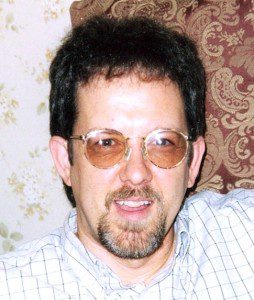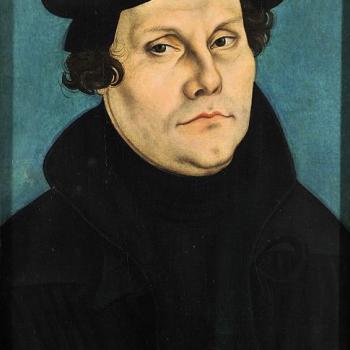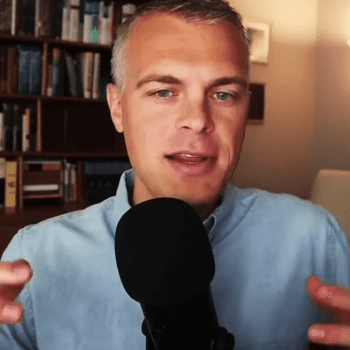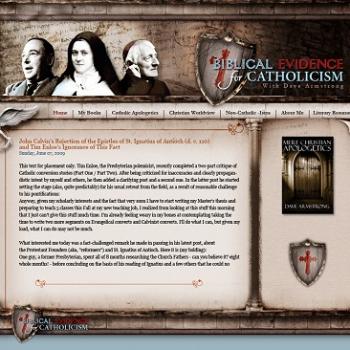
***
Introduction by webmaster Stephen Hand (Traditional Catholic Reflections):
Many, many, know David Armstrong by his most comprehensive and highly regarded, award winning Catholic website (very highly recommended by TCR!); others know of his efforts to show people of all faiths the biblical and philosophical basis of the truths of the Catholic faith. Now that his first book is hitting the stands, TCR and Canonist Peter Vere asked David if he would mind doing an interview with us to introduce him to those who might still not know of his journey and work.
The best kept secret of the Catholic Apologetics (defense of the Faith) movement is Dave Armstrong. How do I know? From experience. Some time ago, while struggling with the Catholicity of the Church after the Second Vatican Council, I encountered Dave on an email discussion group and immediately challenged him to a debate. Rather than accept my challenge, Dave invited me to converse with him on the subjects of the Roman Papacy and the role of Tradition in the Church.
During our conversation, I found Dave’s honesty and sincerity refreshing. With regards to the authentic expression of Catholicism, he was both gentle and firm. At the time, I did not know these were hallmarks of Dave’s Catholic evangelism, and this is why Dave was instrumental in bringing me back to the Catholic Church. Rather than refute any of the objections I raised against the Catholic Church, Dave held my hand and encouraged me to confront them. Afterwards we parted ways as friends, my confidence in the Church restored.
Dave and I recently crossed paths again, owing to the release of his new book. Entitled A Biblical Defense of Catholicism, I recommend this wonderful resource to anyone interested in becoming a Catholic apologist and evangelist. To give a little bit of Dave’s background, he is 43 years of age, and was received into the Church ten years ago by the legendary catechist Fr. John Hardon, S.J. Along with his wife Judy, Dave Armstrong has three sons and their family has recently been blessed with their first daughter.
With regards to faith background, Dave was raised liberal Methodist, became almost a pagan for ten years, with occultic leanings, and converted to evangelical Protestantism in 1977. He was involved in counter-cult work in the early 1980s and started writing apologetics at that time. In the late 80s he became a campus missionary and pro-life activist. He has published several articles since becoming a Catholic, and his work has been featured in The Catholic Answer, Envoy Magazine, This Rock Magazine, and Tradtional Catholic Reflections. His journey into the Catholic Church is one of many to appear in the Catholic best-seller Surprised By Truth, and Dave’s website won Envoy Magazine‘s prestigious website of the year award for 1998.
Pete: As a former Protestant, did you ever find yourself hating the Catholic Church?
Dave: No. I was never a fundamentalist, nor was I a Calvinist: systems of belief where this tendency is the strongest. I certainly fought vigorously against the doctrines of the Catholic Church that I disagreed with, but I always regarded Catholics as brothers in Christ, however much they were “deluded” in various ways. We even played John Michael Talbot songs at our wedding, six years before my conversion. I always loved Church history too, and was somewhat of a medievalist. It’s difficult to be anti-Catholic when one so greatly admires the cathedrals, knightly chivalry, St. Francis, St. Thomas Aquinas, St. Thomas More, and so forth.
Pete: Now what brought you into the Catholic Church from Protestantism?
Dave: The short answer I always offer consists of three elements: i) A realization that the Catholic Church had uniquely preserved in its fullness the moral theology of the early Church, particularly regarding contraception (which was the first thing I changed my mind about), abortion, and divorce. ii) A study of the events of the 16th century from both sides, instead of from only one (naturally biased) side, and discovering that my hero Martin Luther and others of his cohorts were not nearly so “pure” and noble as I had thought, and that they were far more revolutionaries than reformers. iii) Development of doctrine as an adequate explanation of Catholic doctrinal growth (as a result of reading Cardinal Newman).
Pete: Who were the most influential instruments of your conversion?
Dave: My friend John McAlpine, a fellow pro-life activist, who patiently offered replies to my endless and vigorous questions, and who suggested that I read Newman. His example of an articulate, informed, orthodox, and (above all) charitable Catholic was crucial. The late Fr. John A. Hardon, S.J., whom I was privileged to meet and sit under as an informal student, during my journey. Cardinal Newman was the biggest intellectual influence; I had also read (early) Thomas Merton, Karl Adam, G.K. Chesterton, and Thomas Howard, and was enormously impressed by all of them. I had long enjoyed Malcolm Muggeridge. And of course, I admired tremendously John Paul II and Mother Teresa.
Pete: What role did the Holy Eucharist, the Blessed Mother and the Papacy play in your conversion?
Dave: The Catholic doctrine of the Eucharist was not a very large roadblock. I simply accepted transubstantiation once I was convinced of the authority of the Catholic Church. I do remember someone relating it to the Incarnation, and that made sense to me. If God could become a Man, He could also become substantially present in what appears to be bread. I already regarded the Blessed Virgin Mary as the greatest woman who ever lived, and was utterly fascinated with the Second Eve concept, when my friend John first carefully explained it to me: that became the door to a fuller, Catholic Mariology. I loved analogy and types and shadows, so that sparked my interest. And the papacy (eventually) seemed to me a reasonable and necessary governmental element which would help to keep the Church unified (I had always detested the rampant sectarianism in Protestantism).
Pete: How did you go from being a Catholic convert to a Catholic writer, apologist, and evangelist?
Dave: I didn’t really undergo any transformation in that sense, as I had already been doing those things for some nine years, as an evangelical. So it was natural to continue doing so. I think my conversion, however, gave me a fresh impetus and much more motivation to write. What is now my first book was originally lengthy explanations of Catholic distinctives (done on a typewriter) intended to bolster my confidence in and understanding of my newfound discovery, and to explain myself to my Protestant friends. I didn’t even think of publishing them for a year or two. Once I got online in early 1996 I have written more or less constantly. I amaze myself, how much I have written!
Pete: Why do you employ a dialogue style of evangelism and apologetics over a more confrontational debate style?
Dave: Some would dispute that I am not confrontational! My goal, initially, is to find common ground: a foundation on which to build an argument, so that perhaps I can persuade my opponent, like St. Paul’s methodology in his sermon on Mars Hill (Acts 17). I have also sought to follow the Apostle Paul’s injunction: “I have become all things to all men, that by all means I may save some.” And I was profoundly influenced by Socrates, in a college philosophy course, even before I was involved in apologetics. I’ve tried to carry on conversations on the level of “equals,” rather than from an attitude of “superior-subordinate.” I think this is all a part of being as charitable as we can in presenting Catholic claims.
Pete: What is the importance of charity when engaging in Catholic evangelism and apologetics?
Dave: It’s supremely important; indispensable. I think people are far more influenced by that than by the arguments themselves, as I was myself, with regard to my friend John, as noted above. Apologetics, as I (and virtually all apologists) see it, is only a means to remove “roadblocks” and objections to faith, and Catholic doctrine. People are ultimately convicted and converted by the Holy Spirit and grace. God may use our paltry efforts now and then, but they are always a small part of the large picture. Our greatest influence on a human level is the charity we show. All people respond to love, but they don’t all respond to arguments and reasoning. At the same time, we need to be firm and unwavering in presenting truth, and it will offend some folks no matter how gentle we are, because that was the case with our Lord Jesus as well, and He was, of course, perfect.
Pete: Of what importance is prayer when engaging in the type of ministry you conduct?
Dave: As important as charity, if not more so. We mustn’t separate the mind from the heart, or pit theology against spirituality and devotion and worship and prayer. This is one of the many glories of the Catholic Church: it doesn’t create false dichotomies, as so many other Christian groups have a tendency to do. The greatest Catholic mind ever, St. Thomas Aquinas, was also a thoroughgoing mystic, with a profound eucharistic and Marian devotion. We can’t do it ourselves; we are only vessels, entirely enabled by God’s grace to do what we do as apologists. Anyone who doesn’t fully understand that has no business being an apologist. We’re out to win souls, not arguments, though we do try to demonstrate the superiority and truthfulness of our beliefs, by means of rational, biblical, historical argument, of course. It’s mainly an attitudinal question.
Pete: Now you were one of the first individuals to engage in active apologetics against modern day integrism. In fact, you were instrumental in my return to the Catholic Church from the SSPX schism for this very reason. What is the true role of Tradition in the Church?
Dave: What a huge question! I would say that Tradition is what the Bible describes as being “passed down” from the Apostles to the faithful, through the centuries: the body of Christian truths, uniquely preserved in the Catholic Church. Dogma is non-negotiable. Other things such as customs and liturgical matters can be changed, and can incorporate cultural diversity. Tradition is infallibly communicated in Ecumenical Councils and by popes, in the ordinary and extraordinary Magisterium. That’s why it is folly for any Catholic to arbitrarily select which doctrines (or papal and conciliar decrees) they will accept and which they will reject. I’ve often noted how some “traditionalists” have (quite ironically) combined the modernist principle of picking and choosing (“cafeteria Catholicism”) and the Protestant principle of Private Judgment (where their own opinion is in effect the final arbiter), as opposed to a true submission to the Church and granting of even internal assent to solidly-established Catholic teachings.
Pete: Because of your strong Internet presence, many Catholic teens and young adults have been attracted to your ministry. What advice can you share with them concerning how to be an effective Catholic apologist?
Dave: Read and study (a LOT), pray (always), live the life and belief-system you proclaim, boldly share your faith by stepping out and seeing what God can do with any person willing to be used by Him. Start on the Internet, or with good friends who seem open, and start slowly. Don’t push it with parents and spouses. Admit when you don’t know something: that will always reflect well on you. That night you can find a ton of stuff on the Internet or in books in order to go back the next day and offer a strong and reasonable answer. Don’t ever pretend to know something you don’t know. Acknowledge common ground, and really listen to the other guy (not just pretending to as a sort of “tactic”). Use wisdom and prudence in matters of timing. Separate people from their ideas, and believe the best of them, as Paul tells us to do in 1 Corinthians 13. As St. Francis said: “preach the gospel at all times; if necessary, even using words.” I love that.
Pete: In concluding this interview, I wish to thank Dave for answering these questions for our readers. I have immensely enjoyed reading his book, and imagine our readership will enjoy it as well. With a Foreword by Fr. John Hardon, Dave Armstrong’s A Biblical Defense of Catholicism is 230 pages of solid apologetics, . . . It includes a handy Scriptural Index, convenient footnoting and a large 12 page Bibliography of recommended apologetics books . . .
Dave’s second book, More Biblical Evidence for a Catholicism, is a companion to the first, picking up where the first left off and going into more depth as to the basis of Catholic doctrines. It has a Foreword by Scott Hahn and is scheduled to appear in December 2001.
*****
Meta Description: Pete Vere interviews Catholic author and apologist Dave Armstrong, concerning his work.
Meta Keywords: Catholic apologist Dave Armstrong, Catholic author Dave Armstrong, Pete Vere
















